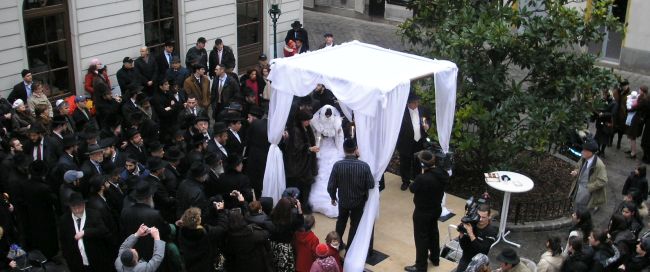
When a man marries a new wife…he shall be free for his home for one year, and he shall gladden his wife whom he has married. One shall not take a lower or upper millstone as a pledge, for we would be taking a life as a pledge.[2]
The juxtaposition is puzzling. What does the taking of a millstone as a pledge for a loan have to do with getting married? What the Torah may be doing, I believe, is addressing a problem that I see all around me: overspending on lavish wedding celebrations. People spend wildly on fine foods and delicacies, without regard to the impact of their excess. As a result, they find themselves unable to later support their families, and must throw themselves upon the public for support.
This is preposterous. People should gladden the hearts of their new wives; the wedding should be a festive occasion. But it should not come at the cost of someone sacrificing his financial stability, like the debtor forced to hand over his millstone to secure a loan, which prevents him from earning the money he needs to pay back the loan and to support himself. By spending on a lavish wedding, the groom does the same – he sacrifices his financial future. It is as if he took his very life as a pledge.
Prayers Wanted
He is poor; his life depends on it. Let him not call out against you to Hashem, for it will be a sin in you.[3]
On the face of things, the pasuk warns against mistreating a poor worker, who will cry out to Hashem in his anguish, resulting in some Heavenly retribution against his oppressor. Were this the case, however, why would our pasuk speak about not calling out against his employer? The Torah should have written “lest he call out against you,” as it does elsewhere.[4] It would also mean that the Torah would be describing the rather disappointing and small-minded reaction of the aggrieved party. While we know of such people, it would be incongruous of the Torah to showcase the behavior of a person who, because of a single grievance against a fellow Jew, cries out to HKBH to punish his victimizer.
We could explain differently. We need not assume that he acts improperly because of a short fuse. Rather, the poor person here is fully righteous – so much so, that he has become a “regular” in the Heavenly Court that listens to the prayers and entreaties of people. He is always davening. In times of special, intense need, he focuses his powerful prayers on his personal needs. When those needs do not preoccupy him, he davens intensely for the well-being of the rest of the Nation, and for his family and loved ones.
With only a handful of exceptions, even those who seem righteous to us are not fully righteous when examined by the full extent of Divine justice. So this worker might very well find himself impoverished at some time. He may become so needy that prompt payment by this employer will determine whether he and his children will have any food to put on the table. The Torah therefore cautions the employer to pay his worker promptly. Should he not do so, the employee will have to cry out to Hashem to assist him in finding food. While he would ordinarily pray for all those around him – including the employer who wronged him – he might become so distraught and involved in his own needs, that he will focus his prayer entirely on his own immediate needs.
It is this that the Torah warns against. Should the worker become so hungry that he will cry out to Hashem to relieve his own plight, he will not cry out to Him to forgive the employer! His failure to pay the worker on time as the Torah demands will remain “a sin in you!”
- Based on Meleches Machsheves by R. Moshe Cheifetz, 1663-1711 ↑
- Devarim 24:5-6 ↑
- Devarim 24:15 ↑
- Devarim 15:9 ↑


